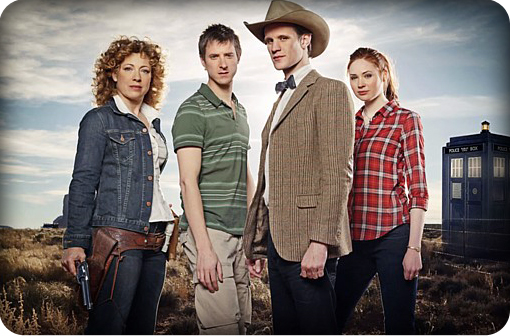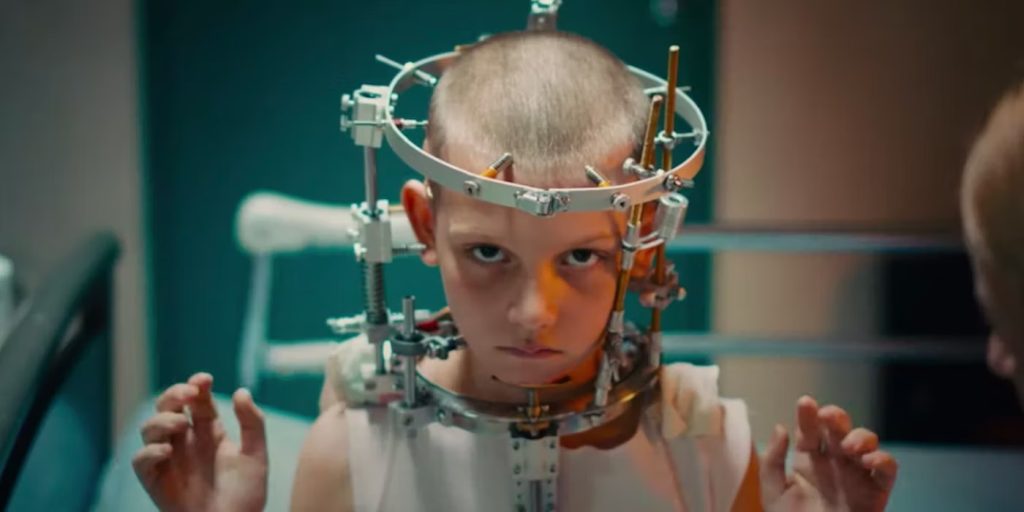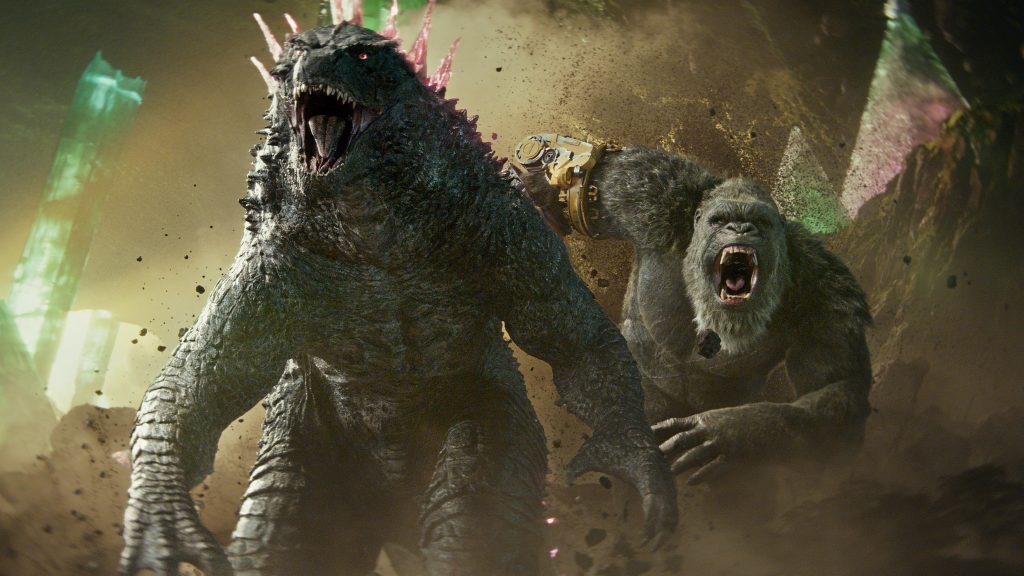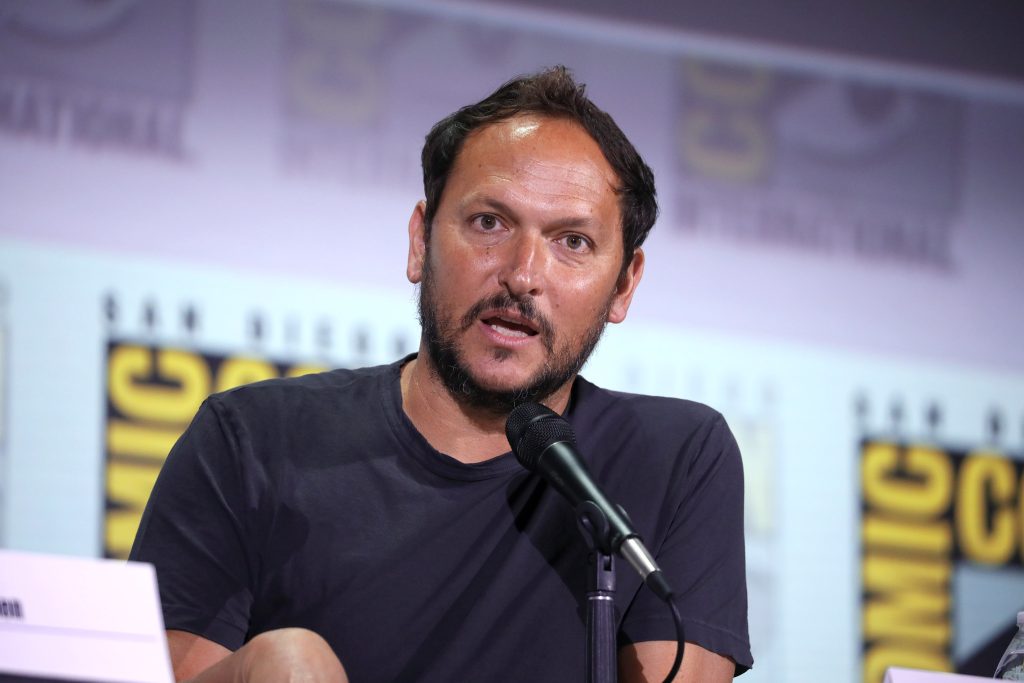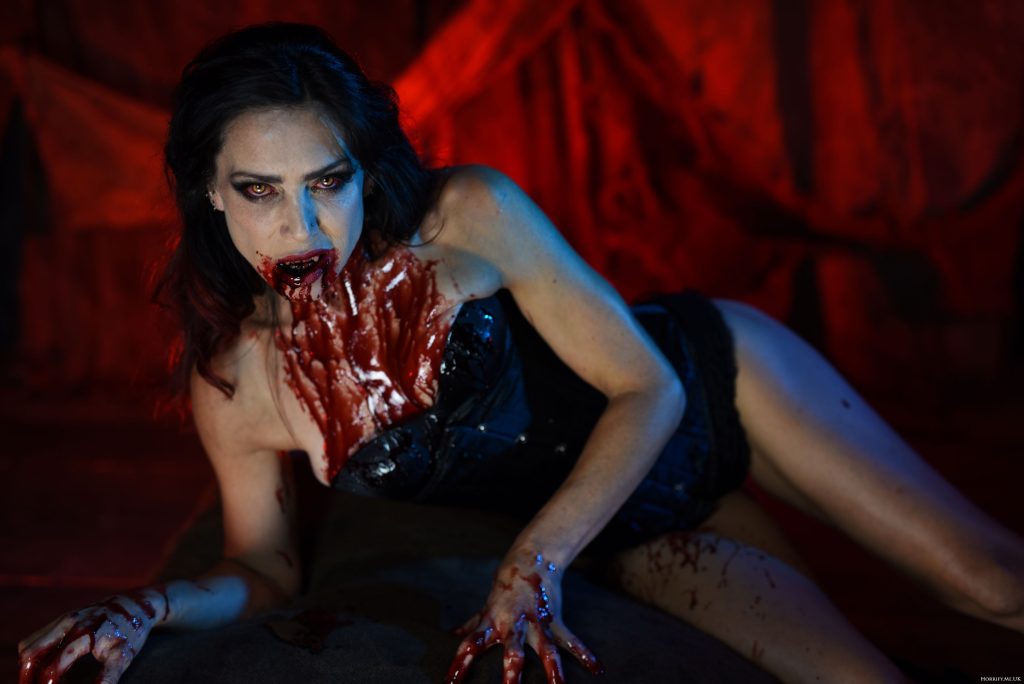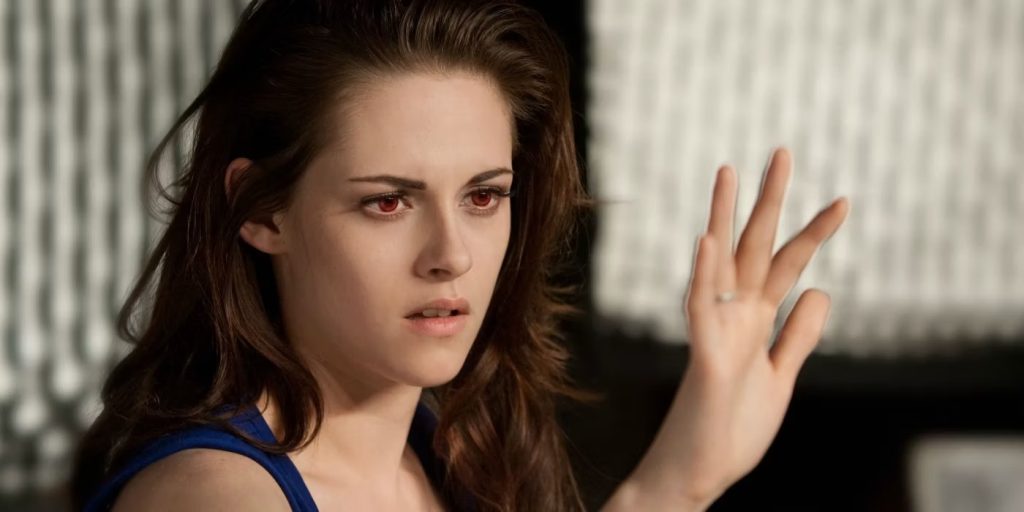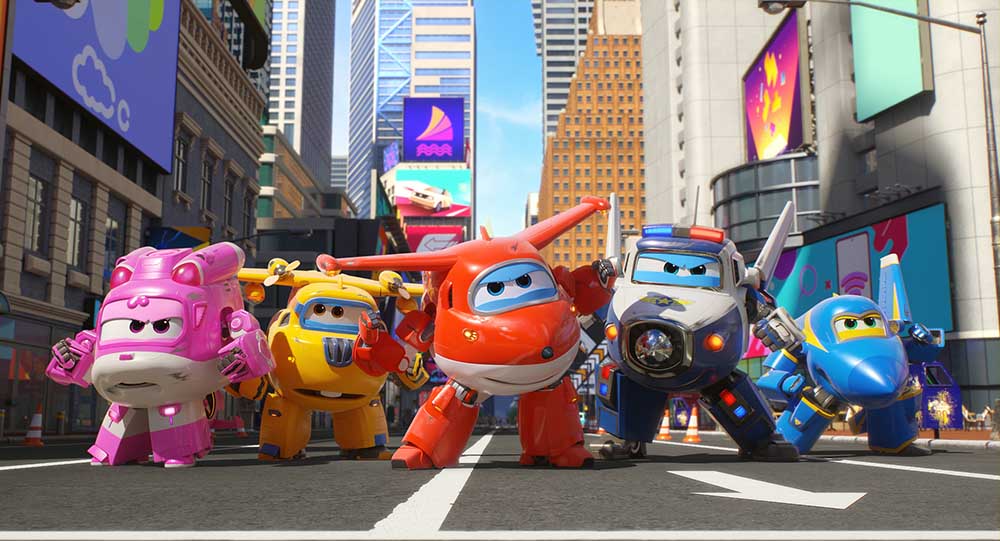Even the sixteen-year hiatus didn’t feel as long a wait as this: after the open-ended conclusion to Series Five, and the sideways step that was A Christmas Carol, we finally arrive at Series Six, in the midst of a barrage of hype, and in the hope that the opening story – the first multi-episode series premiere since Doctor Who returned – will provide some of the answers…
No such luck.
Steven Moffat immediately pokes fun out of his new-found convention of having an elaborate, time-hopping pre-credits sequence culminating in the Doctor arriving at the scene of the action, by having an elaborate, time-hopping pre-credits sequence which has nothing to do with the Doctor arriving at the scene of the action (although we don’t yet know for sure if any of these scenes will turn out to have been important in six months’ time, of course). Moffat goes one further at the top of Part Two. Day of the Moon hits the ground running with six minutes of dashing about (including one of Moffat’s patented rescue sequences that beg the question of whether the fifth Doctor refused to go back in time and rescue Adric because of the Blinovitch Limitation Effect, or simply because he didn’t like him) that seem to achieve nothing at all. It’s a very odd choice, in fact, to have the titles crashing in six minutes after the previous episode reprise, but one that’s perfectly in keeping with the current regime: they love their pre-titles mayhem, this new crew.
Elsewhere, the Grand Moff Steven seems content to roll out the rest of his Greatest Hits package once again: yes, there’s more wibbly-wobbly, this time with the scene on the beach effectively acting as a ‘spoiler’ for events yet to unfold (the Doctor’s “let’s go off and have some adventures first” declaration at the end of the 90 minutes seems like nothing more than Moffat pre-empting those who’re bound to criticise this suspension of the bigger plot). There are people leaving messages for themselves on electronic recorders, scribbled writing on the walls (and people’s own skin), and a perfect prison that proves less ‘perfect’ than its creators would wish. In addition, the space-suited child seems like nothing more than an inversion of the boy who is faceless beneath the mask in The Empty Child, somehow crossed with the Vashta Nerada-inhabited space-suits of Silence in the Library. Even the Silents don’t escape from having all been seen before: half Weeping Angels (don’t look away!) and half Cracks in Time (or you’ll forget!).
However, Moffat dazzles to deceive with the consummate skill of a master magician.
The Impossible Astronaut is deceptively slow-burning, hopping about like a temporally-challenged grasshopper on downers, and introducing characters and concepts that you can almost sense will become more important in other stories than the one we’re seeing. Day of the Moon ramps up the tension and the action even further, behaving less like a concluding chapter than an amphetamine-fuelled sister-story. It’s almost impossible to reconcile the two halves of this story (or even just the events of the story…), and yet that’s Moffat in a nutshell: the first instalment builds to a ridiculous and unlikely climax, which the second instalment then bats into a cocked hat before running off somewhere else altogether (see the Series Five finale for more of the same). You can almost hear Steven Moffat grinning at his computer screen as he writes this stuff.
But what of the location? The setting of these two episodes is almost tantamount to Moffat cocking a snook at Dreamland for not being able to do the America in live action that they could manage as a cartoon. In practise, we get a few minutes’ worth of outdoor footage at the beginning of each episode, before everybody heads indoors for the rest of the duration. It’s the perfect set up, convincing the viewer of the veracity of the setting while producing the meat of the episodes as ‘cheaply’ and as cheerfully as per the norm, and it works. Just as it used to in classic Doctor Who in fact, in the late Patrick Troughton era particularly; rather aptly, given that that’s the period in which this story is set (there’s a sense of the old school bleeding into Moffat’s brand new vision for the show right the way through). America looks beautiful and quite unlike anything the series has ever attempted before, giving the opening story of the series a unique feel that helps feed into the way Moffat is opening up new avenues in Doctor Who both literally and literarily.
Far more than any series opening story before, though, The Impossible Astronaut and Day of the Moon are concerned with plot and its consequences – and not just the consequences that are to come, but the consequences of what has already happened. The Silence (or the Silents), for example, are the ongoing plot of last year’s series finally made flesh. I’m not quite sure how they tie in with the proclamation that “Silence will fall!” (particularly since they have apparently been around since the dawn of mankind), or indeed whether this really is the last we’ll see of them (Amy spots one in the 2011 segment, for example, and their assertions to her just before her rescue are surely going to be significant later on), but they’re a spooky, X-Files-esque creation that is as vaguely defined as their modus operandi would deem appropriate.
While the Silence seem to be the A-plot (and the one which is apparently concluded), there’s something much bigger and much more important afoot, which this whole series seems to be being sold on the back of: the Doctor’s death. It’s a thunderous piece of misdirection when this prologue turns out not to be the set up for the adventure at hand, but for the rest of the year’s story arc, and the fact that the death of the Doctor is left entirely open-ended is both baffling and audacious; The Impossible Astronaut isn’t the name of the first half of a two-part adventure, it’s the tease that will reverberate down through the eleven episodes that will follow (and knowing Steven Moffat, into next year’s series – which who knows, might well not start until the autumn of 2012 – as well).
Because it’s not just the prologue that’s part of the bigger picture. If the Doctor’s death (in which he seems almost certainly complicit) is a shock at the start of the story, then there’s a surprise of equal magnitude at the end. The little girl who inhabits the astronaut’s costume, who’s somehow central to events and somehow haunted by what’s to come, regenerates. Let me repeat that: regenerates. For why and into whom, are questions to which the answers can only be guessed at. But the consequences for the Doctor, not to mention the programme itself, can only be devastating. Wherever Steven Moffat takes this particular storyline, this is something that will be talked of as long as there’s still a Doctor Who.
Meanwhile, back in the more mundane world of the companions, there are still complex and potentially paradigm-shifting seeds to be sown. Neither Amy Pond nor River Song are here as passengers; Moffat has plans for them too. Amy’s shattering announcement at the end of Part One is quickly retracted at the beginning of the next episode, in a moment of bluff for both character and author; because we know that the moment Amy’s pregnancy is confirmed, the Doctor will have no other choice but to terminate her and Rory’s TARDIS travels forthwith. But is Amy’s baby more than just a baby? Can a baby conceived in the TARDIS be just a normal baby?
For River, it’s not a beginning but an ending: she and the Doctor have been approaching their relationship from opposite ends of the temporal spectrum for some time now, and Day of the Moon is finally the episode in which for him it begins, but for her (and while we’ve yet to see it, and have it confirmed what ‘it’ actually is – although this episode goes a long way towards doing that) this is the last kiss. Alex Kingston fills the character with more humanity in this story than we’ve seen since River’s debut, knocking the criticism from last year, that the character had become little more than a walking plot facilitator, on the head. And complaints about Karen Gillan’s obnoxious, shouty Amy Pond (the one we spent Series Five in the company of) will have been swallowed, too: she’s much calmer, much more human in this story.
A word on the minor characters: Stuart Milligan makes for a grotesque but benign Richard Nixon, and Mark Sheppard (and his dad!) a sympathetic if contradictory Canton Delaware, while Marnix van den Broeke is suitably other-worldly as the only speaking Silent (we’ll call him Bob, for now), but as ever with Steven Moffat, the story’s really about those four central characters who travel more regularly in the TARDIS. Largely marginalised as Rory, Arthur Darvill is still great value for his appearance and the Doctor (in a performance from Matt Smith that tones down some of the more excessive mannerisms that were just about beginning to threaten annoyance), while at the absolute centre of the plot, is often sidelined in his own story: these two episodes are all about those two girls.
Moffat’s vision of Doctor Who seems predicated on big ideas and even bigger images, connected together by the join-the-dots plotting of a manic but genius child. The end of the Silence is a piece of clever-clever storytelling that bursts more or less out of the blue and is gone almost before you even have chance to question it, followed by a bravura sequence that makes the destruction of the Daleks in Journey’s End seem pretty tame by comparison. And before even that gets chance to sink in, we have further revelations about both River and then Amy to think about (not to mention poor Rory and his marital doubts). In fact, Moffat loves to tuck away his character and exposition in scenes that have so much else going on, you almost forget they’re there.
These two episodes leave us with a lot more questions than they’ve managed to answer, and we can only hope that by the end of the year, we’re not left disappointed. But for now, we can simply thrill to the maddest, boldest and most experimental opening to a series of Doctor Who since Castrovalva in 1982. If not ever.
For what Steven Moffat has done (last year too, of course, but here more so than ever), is take Russell T Davies’ vision of a Doctor Who in which certain things might later prove more important than they seemed (for example, the way in which the events of The Long Game ultimately set up the Bad Wolf finale), and ramp it up to the absolute maximum. In this year’s curtain-raiser, everything might be more important than it seems, and that’s some feat. And if I’ve been guilty of mentioning Mr Moffat rather overmuch in this review, then that’s because the Doctor Who of the here and now seems to be more about him and his stewardship than has ever been the case before. It’s impossible to imagine these stories without Moffat at the helm, and even more impossible to imagine Moffat writing a Doctor Who that doesn’t resemble this.
Ultimately, it’s perhaps testament to Moffat’s repeated use of the old wibbly-wobbly, that even though his take on Doctor Who is proving hard for me to swallow right now, it’s easy to see that a few years down the line I’m almost certainly going to be looking back on this version of the show very fondly indeed.
Hence:



